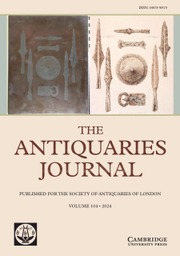Article contents
Cirencester 1962: Third Interim Report
Published online by Cambridge University Press: 29 November 2011
Extract
The excavations of 1962 were originally planned to take place on three sites: the Amphitheatre, which lies outside the town wall a little to the south-west; a rescue excavation in a derelict garden in Coxwell Street; and a section across the front of the south-east defences at a point about 200 feet west of Miss Rennie's section cut through them in 1952. A week after the start, news came that work for a new police station was to commence during the current financial year, on a site north of Dyer Court, which our Fellow Dr. Graham Webster investigated in 1957. With such short notice, rescue work had to begin here almost at once. Imminent development of yet another building-site, in Victoria Road, was reported towards the end of the excavations, which had to be extended for a fortnight to meet this fresh emergency. Five sites have thus been dealt with this year instead of three, an undertaking of considerable magnitude, and the Committee here records its most grateful thanks to each of those bodies who contributed towards the expenses; to all those who assisted the excavations; to the Gloucestershire County Council for permission to explore the police station site; to the Cirencester Urban District Council for permission to dig in Coxwell Street; to Lord Bathurst for permission to dig at the Amphitheatre; to Mr. Harry Pitts for permission to cut a section across the southern defences; and to Messrs. R. van Gelder, Keen and Co. Ltd.
- Type
- Research Article
- Information
- Copyright
- Copyright © The Society of Antiquaries of London 1963
References
page 15 note 1 Antiq. Journ. xxxvii, 206.
page 15 note 2 T.B.G.A.S. lxxviii, 44.
page 15 note 3 Mr. A. D. McWhirr was fortunately able to stay at Cirencester to supervise the excavation of this site, for which the Committee were most grateful.
page 15 note 4 Those that contributed were: The Society of Antiquaries of London; H.M. Ministry of Public Buildings and Works; the British Academy; Cirencester Archaeological and Historical Society; Bristol and Gloucestershire Archaeological Society; the Haverfield Trust and the Craven Fund of the University of Oxford; the University of Leicester.
page 15 note 5 Mrs. A. Wacher, Miss E. Dowman, and Messrs. A. Perkins and A. D. McWhirr acted as site-supervisors. Mr. A. L. Pacitto acted as photographer and Mrs. H. J. M. Petty supervised the pottery-shed. Mr. H. J. M. Petty, F.S.A., was in charge of the site accounts. Members of the Cirencester Arch, and Hist. Soc. again provided a service of guides for the public.
page 15 note 6 Mr. P. G. Miller, Headmaster of the Grammar School, kindly gave permission for this survey.
page 15 note 7 Antiq. Journ. xlii, 3.
page 16 note 1 Compare Antiq. Journ. xlii, fig. I.
page 16 note 2 In i960 this street was noted by Mrs. Helen O'Neil, F.S.A., in a sewer trench not far from the present site. A plan was deposited in the Corinium Museum, but was unfortunately overlooked when the street plan was prepared last year.
page 19 note 1 The Cirencester Urban District Council generously defrayed the cost of this work.
page 21 note 1 One day's heavy rain during the excavations was found sufficient to produce up to 6 inches of silt in the bottom of some trenches.
page 22 note 1 Antiq. Journ. xli, 63.
page 23 note 1 Reported briefly in the account of the Brit. Arch. Association's visit to Cirencester, J.B.A.A. xxv, 106, to which Mr. Real kindly drew my attention.
page 25 note 1 The word ‘first’ is used here without prejudice to any earlier period which may subsequently be discovered.
page 26 note 1 Staehelin, F., Die Schweiz in Römischer Zeit (1948), 469Google Scholar.
page 26 note 2 Bonn. Jahrb. 145 (1940), 33 ffGoogle Scholar.
page 26 note 3 Antiq. Journ. xxxvii, 209.
- 3
- Cited by


